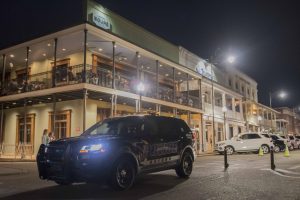The Oxford Police Department and local bar owners have said they have not seen any change in Square safety since the city’s Alcohol Ordinance went into full effect at the start of this year.
The ordinance, which was voted into effect last September by the Oxford Board of Aldermen and backed by OPD, seeks to increase safety and crack down on certain crimes by requiring restaurants and bars that serve alcohol to install security cameras, use ID scanners and display written safety measures in their buildings for customers.
“We haven’t noticed any difference yet,” OPD Captain Alan Ivy said. “We have to have cooperation from owners, managers, bartenders and security for the ordinance to work.”
The city required bars and restaurants within the “downtown entertainment district” to comply within 30 days of the implementation of the ordinance in September and gave citywide locations until January 1 to adhere to the changes.
The ordinance passed after several months of debate about whether the ordinance reflected a racial bias, invaded personal privacy or would realistically solve the problem of underage drinking on the Square.
Some believe, however, that the rules of the ordinance are only being enforced in certain areas of the Square.
Griffin Tanner, an Oxford local and an owner of Round Table on the Square, The Levee, The Cellar, Harrison’s and Southern Craft Stove and Tap, said he has been to restaurants around Oxford that seem not to be complying even though the deadline has passed.
“I’ve been to many restaurants and places not on the Square that don’t have (ID) scanners,” Tanner said. “I haven’t seen their exit strategy posted anywhere. I’m not going to tell on them because that’s not my place, but they check our stuff every week, sometimes, to make sure we’re in compliance.”
In addition to questions regarding accountability, Tanner mentioned that the ID scanners, used to catch fake IDs on underage patrons, can slow his lines.
At the Levee, Tanner said this has led to safety hazards involving car-traffic and pedestrians in the past, with hopeful bar patrons blocking the road outside the establishment.
Despite the problems, Tanner said OPD has been patient and continues to assist both him and his staff to ensure the safety of all involved.
“Saturday night, (an OPD officer) called us. The Levee had a 200 or 300 person line at 8 p.m.,” Tanner said. “They were pushing, and it was hard for us to control our line because there were 200 people trying to get in. We weren’t written up. He was very helpful, and he even helped us work the door.”
Tanner said that, while he doesn’t believe his larger bars are being unjustly targeted for arrests or police walkthroughs, the size of the bar has a major effect on the number of fire marshal and OPD visits.
According to the City of Oxford’s website, the specific goal of the Alcohol Ordinance is to create safe venues for customers and to discourage illegal activities, but business owners and OPD alike have yet to see a major impact on Square safety following the ordinance implementation.
“This will be a long process,” Ivy said. “We will not have enough data to measure the effectiveness until at least after the upcoming football season.”

Oxford Police Department blocks a section of East Jackson Avenue last year. OPD and some bar owners have reported that they have yet to see any noticeable improvements in safety since the enactment of the city’s Alcohol Ordinance. File photo: Christian Johnson
Ivy said cooperation and patience will be required of business owners and citizens in order to see the goals of the ordinance achieved. Despite the controversy surrounding the ordinance, Ivy is optimistic about the consequences of its full-implementation.






